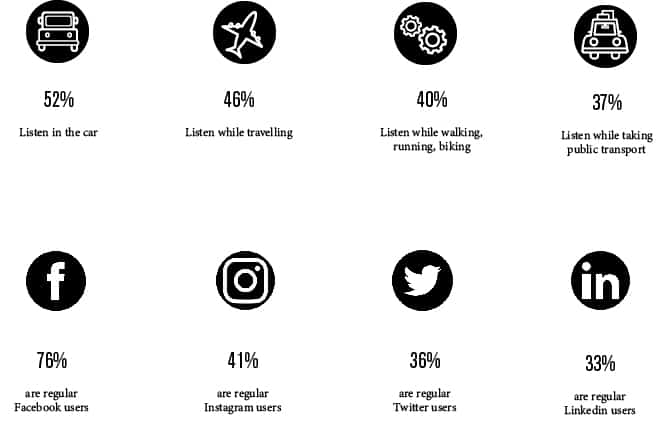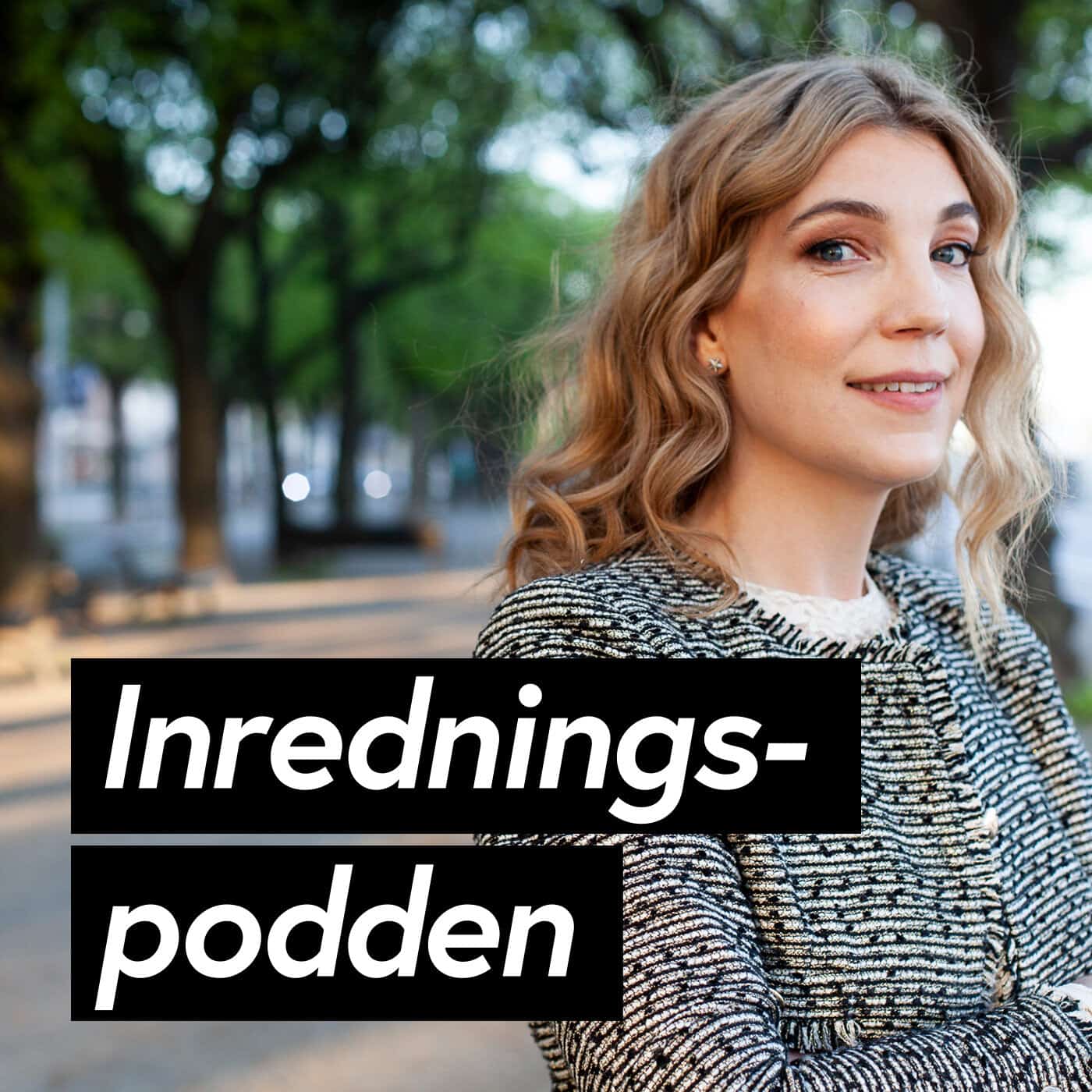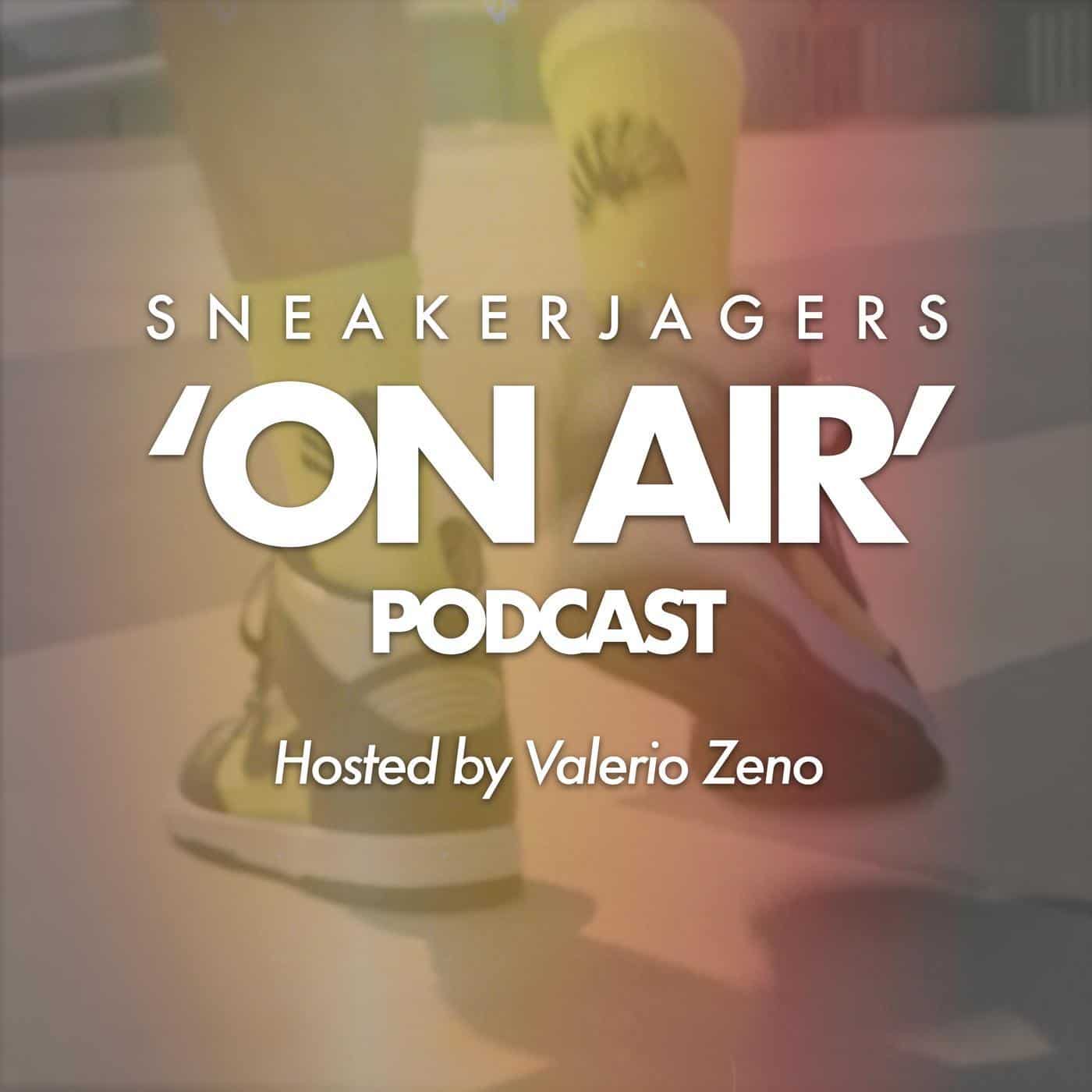The Power of Podcasting
Podcasts are not a new format in 2020. Nevertheless, it is a marketing element with many, and still untapped, possibilities. VOCAST has created a Podcast list for Fashion and Home/Interior, for each market to help our brands navigate in the podcasting sphere.
The podcast market is predicted to break the $1 billion revenue threshold in 2021 based on current trends and growth and despite the economic crisis (Improve Podcasts, 2020). The medium is highly popular, to say the least, and is known for its loyal and engaged listeners. With increasingly saturated and crowded social media channels, finding innovative ways to reach your target is undoubtedly becoming difficult.
By knowing more about the medium and how to navigate with it, brands will have the opportunity to benefit from sponsoring or partnering up with a podcast, which will help boost brand awareness and to reach beyond the existing customer base. So why not consider podcasting as a tool for your next marketing strategy?
Research shows that people who listen to podcasts are more focused on the content as they have actively chosen to listen to the specific episode (Acast & Nielsen, 2018). Unlike the endless scroll where the viewer filters out most of the visual content, for advertisers, an attractive factor of podcasting is the niche segments represented in the audible space, which is characterized by loyal trades and high recommendation power to their peers. Consequently, the podcast audience has its own features and particularities.
The possibility for independent podcast producers or brands to compete with large-scale institutional podcast productions is comparable to the function of YouTube, blogging, and other social media, where the democratization of distribution and availability may enable these to successfully reach a mass audience. Considering that people are big fans of on-demand services, podcasts are flourishing and can additionally serve a popular ‘binge experience’.
Key features of the podcast audience
The growth of the podcast media represents an important opportunity for digital marketing audiences to have a high trust for podcasts and their hosts, and brands are slowly starting to invest larger sums into podcast advertising.
Podcast consumption is increasing globally by a few percent each year. In the U.K alone, the weekly podcast listeners have nearly doubled in the past five years an estimated 42 million Americans (14%) are weekly podcast listeners (Acast & Nielsen, 2018). In Denmark, 18% of the population listens to podcasts on a weekly basis, with 31% of these being 15- to 31-year-olds (DR, 2018).
This is why podcasts are starting to establish themselves in mainstream markets, representing important marketing opportunities for lifestyle brands (WGSN, 2017).
🇩🇰 1.3 million weekly listeners
🇩🇪 10.4 million weekly listeners
🇫🇷 4 million monthly listeners
🇮🇹 7 million monthly listeners
🇬🇧 5.9 million weekly listeners
🇺🇸 104 million monthly listeners
🇳🇴 1.4 million weekly listeners
🇸🇪 1.6 million weekly listeners
🇳🇱 5.5 million monthly listeners
🇧🇪 2.2 million monthly listeners
Typically, the podcast listener is a consumer with a higher education choosing podcasts specifically as a media in order to relax. In many ways, podcasts are a great media for those who seek other types of content to consume other than visual ones. The loyal podcast listener in the UK spends more than 3.6 hours a week listening to podcasts.
Moreover, the majority of these state that they have recommended either a podcast or a product they have heard about in a podcast. This is an indicator that podcasts have a way higher engagement rate compared to other digital media, as audio becomes a different platform, just like video before it, for brands to speak directly to their most engaged consumers while offering authentic content which could be compared to exclusive “behind-the-scenes” insights of the brands.
“A modern company is of course also using podcasts as an active part of its branding strategy.”
– (BoF, 2019) Podcast listeners are also highly active on social media. As many as 93% of all podcast listeners are actually active social media users. Moreover, 52% listen to podcasts while driving, and 46% while traveling.

Podcasting & the Lifestyle industry
Although luxury lifestyle brands are seldom synonymous with digital innovation, brands have started to experiment with the media over the past years. Admittedly, podcasts are not the widest reach tactic and are by definition not visual. Nevertheless, brands such as Hermes, Margiela, Chanel, Miu Miu and Chloé all now have their own in-house podcast, as they represent opportunities for various marketing scopes to engage listeners in their digital universe through storytelling.
“The new beauty floor at Saks has everything you might expect from a high-end emporium working to prove itself in the digital age: a custom foundation bar, a facial workout gym and, as of last week, a podcast in residence” (BoF, 2019)
Brand narrative
In addition to this, it can be a great contrast and contribution to the increasingly “visual” digital marketing strategies. Through podcasts, brands are enabled to tell the in-depth stories they are unable to tell through an Instagram post. The deeper communication messages, such as editorial works, have inevitably been neglected in the digital era and in this way, podcasting is also a great tool to control the brand narrative.
Podcasts should be used in order to address brand awareness and deepen the relationship with the existing target audience. More importantly, branded podcasts allow brands to strengthen their credibility within their actual market by reaching a target who is already engaged with the brand.
Niche tool
Branded podcasts are a great tool, but they won’t be your broadest reach tool. It is a great way to engage with your existing audience and deepen your relationship. The social nature of the podcast listener makes them even more inclined to be great mediators of word-of-mouth. 3/5 podcast listeners claim to have recommended a podcast or to have recommended a product heard of from a podcast (Acast, 2018).
Narrator
The podcast host holds a key power as the narrator. It is key that this is an acknowledged and trusted person, who the audience can relate to. As a brand, make sure to put your key persona behind the microphone for the most engaged and organic result. Moreover, podcasts offer a way to communicate with local audiences in their language- literally.
While a branded podcast may seem like a larger investment for some, fear not, there are other ways to approach the media: podvertising.
Keep up with the podcast lingo
Although podcasts aren’t new under the sun, it can be difficult to keep track of the terminology. VOCAST has summarized the key terms necessary for understanding the media and its context:
Podvertising: Podcast advertising
Podcast directories: Apps or online platforms where podcasts are listed and available to be listened to
Podcasting platforms: Digital platforms where podcasts are produced or uploaded or both
Spoken banner: A kind of podcast advertising where a message from the advertiser is read out loud.
Read-in advertising: Unlike the spoken banner, this is a kind of podcast advertising where the ad is integrated as content communicated directly by the podcast host.
Branded podcast: A podcast produced by a brand with the aim to engage listeners in their universe through storytelling
Podvertising
Partnering up with an already existing podcast is like partnering up with another brand. There are clear values, the host’s image, and the audience’s expectations to consider. This has to be done strategically when selecting a program and moving forward with the sponsorship process.
A podvertising sponsorship can take many forms but the most common one is a direct response ad, with a specific promotion that easily can be tracked through the point of sale. A direct-response ad can thereafter be evaluated to make sure that the brand gets their wanted ROI.
Usually, a podcast is measured in downloads and a download can’t assure a listen, which can become an issue in the long run. But. Podcasts have other perks that don’t translate into statistics right away but will have positive, long-term effects on building your brand’s image and creating awareness, which is essential in 2020.
Benefits of podvertising
- Mobility: Listeners can bring a podcast anywhere which makes it part of their daily routine
- Engagement: the most loyal audience of all mediums are podcast-listeners, they become addicted to“their” show
- Multi-platform Exposure: Most Podcasts have multiple channels where they communicate and the podvertising will have widespread on socials, newsletters, websites, etc.
- Selectivity: A podcast is carefully selected through a conscious choice by the listener
- Buying Power: The podcast audience is typically in the higher income brackets and is in a close relationship with the host – that have influential recommendation power
- Long-lasting Endorsement: The nature of podcasts allows the advertisement to stay on the episode permanently. Which means that the podvertisment can be downloaded in 2 years and still have an impact
- Spacious: Visual mediums are crammed these days and everyone is there. But there is still room to fill in the audible space
A word of advice:
When adjusting the tone of your brand’s podvertisment consider the listeners context. A survey constructed by Spotify in 2020 showed that forty-five percent of listeners state that they wished brands could better speak to what they’re doing when they hear ads.
The podcast host: Voice of influence and authority
Usually, the podcast host is an official persona who works hard and gradually gain his or her follower base. The relationship between a listener and the podcast host is often perceived as intimate as the audience relates directly to the authority. Listeners form relationships with the host as they often feel that they are being spoken to directly.
The host gains a position of high trust, influencing his or her listeners which is why utilizing the host-voiced advertising, is so efficient.
We interviewed the french interior podcast host Elise Hoppe, from the Brocanist, and the Swedish fashion blogger icon, influencer and podcast co-host of Säker Stil: Ebba von Sydow, to investigate the relationship between podcaster and brand.

Currently, I haven’t any sponsor nor any advertising on my podcast The Brocantist, because I haven’t found the right partner. As I don’t earn any money with my podcast, I always keep in mind that I do the podcast because I like it, and I always try to ask myself: do I still love it? yes? then I continue. Is it relevant to my community? yes, then I continue.
If the right partner happens to knock on my door one day, we will certainly have a discussion about my positioning, my tone of voice, and the values I believe in. And even if there is no obligation for me at the moment to have a sponsor, I have my secret wishlist ready.
Q: Which factors do you consider when entering a collaboration?
Transparency, transparency, transparency. If we work together, I need to trust you and you need to trust me. It’s a win-win. Regarding the topics, I would be happy to promote: any brand in circular economy or sharing economy.
Any innovation that would help to move to a more sustainable and more ethical world. Any partner, willing to move forward really.
Q: How do you see your position as a podcast host to communicate another brand’s message? What are your motivations for doing that?
I used to work in Advertising and I know the target group is the key. So, as long as my community can use the information given by the brand, I am happy. NB: The Brocantist is a podcast that promotes sustainable initiatives in the home interior sector.
Q: Which kind of sponsorships do you usually do/would you like to do?
I would consider doing a promotional code for a product or a service with general information about a brand with a call to action like voting, donating, etc. Other than that, I am open to discuss.

We believe in serving our followers and listeners with free content, which is why we choose to work with partnerships and sponsorships representing more long-term collaborations that mirrors the entire platform of Säker Stil. Which consists of our Instagram account, our channels on Facebook, our newsletter Weekly and obviously our personal accounts, Ebba von Sydow and Emilia de Poret.
Q: Which factors do you consider when entering a collaboration?
Actually only one thing: That the collaboration needs to be enlightening, fun and inspiring for our followers, listeners and friends of Säker Stil out there. That’s the most important, always.
This is simply crucial, given that it has to work for our followers while satisfying our collaborating partner, especially since we love working with brands where we get to learn something new, get inspired and transmit messages of really great products, brands and services.
Q: How do you see your position as a podcast host to communicate another brand’s message? What are your motivations in doing that?
What motivates us daily is that we have so much fun with Säker Stil. Love what you do! Foremost we’re focusing on creating inspiring, fun and lovely content – that’s always first.
After that it’s absolutely amazing to run a business around this, with a great team of clever colleagues – and to use the platform to lift up other people and brands who do great things that we really enjoy, that’s a bonus!
Q: Which kind of sponsorships do you usually do?
We are so proud over the partnerships we work with. A red-thread is that they are brave, dares to try the new, digitally aware, goes for it creatively and trusts us. That, we are deeply thankful for!

Feeling inspired?
VOCAST has gathered the key contacts from the most relevant lifestyle podcasts in each market, in the curated lists. Below you will find an extract of fashion and interior podcasts that might fit your brand. Reach out!
SIGN UP TO OUR NEWSLETTER
Get free knowledge on how to optimize your B2B marketing & new product releases.
RELATED POSTS
The Art of Slow Living: When Thoughtful Choices Redefine Design
With a fast-paced everyday life, the principles of slow living stand in a sharp and perhaps comforting contrast. As the movement progresses, more people are integrating the values of slow living into all areas of their lives – from slow food to slow fashion and slow...
Mastering Sustainable Branding in Interior Design
In recent years, the appeal of trendy marble coffee tables, plush sofas, and finely designed lamps has captivated us all. While the interior design industry often embodies craftsmanship, it also has a less glamorous side: its environmental impact. This reality has...
Beyond the Aesthetic: The Emergence of Stylists as Influencers
In the realm of interior design, stylists, recognized for turning creative visions into captivating editorial and commercial projects, are increasingly emerging as key influencers on social media. The rise of digital platforms has substantially redefined their roles,...












